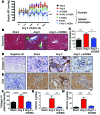DC isoketal-modified proteins activate T cells and promote hypertension
- PMID: 25244096
- PMCID: PMC4220659
- DOI: 10.1172/JCI74084
DC isoketal-modified proteins activate T cells and promote hypertension
Abstract
Oxidative damage and inflammation are both implicated in the genesis of hypertension; however, the mechanisms by which these stimuli promote hypertension are not fully understood. Here, we have described a pathway in which hypertensive stimuli promote dendritic cell (DC) activation of T cells, ultimately leading to hypertension. Using multiple murine models of hypertension, we determined that proteins oxidatively modified by highly reactive γ-ketoaldehydes (isoketals) are formed in hypertension and accumulate in DCs. Isoketal accumulation was associated with DC production of IL-6, IL-1β, and IL-23 and an increase in costimulatory proteins CD80 and CD86. These activated DCs promoted T cell, particularly CD8+ T cell, proliferation; production of IFN-γ and IL-17A; and hypertension. Moreover, isoketal scavengers prevented these hypertension-associated events. Plasma F2-isoprostanes, which are formed in concert with isoketals, were found to be elevated in humans with treated hypertension and were markedly elevated in patients with resistant hypertension. Isoketal-modified proteins were also markedly elevated in circulating monocytes and DCs from humans with hypertension. Our data reveal that hypertension activates DCs, in large part by promoting the formation of isoketals, and suggest that reducing isoketals has potential as a treatment strategy for this disease.
Figures










Comment in
-
Is hypertension an autoimmune disease?J Clin Invest. 2014 Oct;124(10):4234-6. doi: 10.1172/JCI77766. Epub 2014 Sep 17. J Clin Invest. 2014. PMID: 25244091 Free PMC article.
References
-
- Luft FC, et al. Hypertension-induced end-organ damage: A new transgenic approach to an old problem. Hypertension. 1999;33(1 pt 2):212–218. - PubMed
Publication types
MeSH terms
Substances
Grants and funding
- P01HL095070/HL/NHLBI NIH HHS/United States
- R01 HL108701/HL/NHLBI NIH HHS/United States
- P01 HL095070/HL/NHLBI NIH HHS/United States
- K01 HL121045/HL/NHLBI NIH HHS/United States
- R25 GM062459/GM/NIGMS NIH HHS/United States
- P01 GM015431/GM/NIGMS NIH HHS/United States
- F32 HL124972/HL/NHLBI NIH HHS/United States
- R01 HL105294/HL/NHLBI NIH HHS/United States
- R01HL039006/HL/NHLBI NIH HHS/United States
- P01GM015431/GM/NIGMS NIH HHS/United States
- R01 HL110353/HL/NHLBI NIH HHS/United States
- R01HL110353/HL/NHLBI NIH HHS/United States
- R01HL105294/HL/NHLBI NIH HHS/United States
- P01HL058000/HL/NHLBI NIH HHS/United States
- K08HL121671/HL/NHLBI NIH HHS/United States
- R01 HL039006/HL/NHLBI NIH HHS/United States
- T32 GM007569/GM/NIGMS NIH HHS/United States
- K08 HL121671/HL/NHLBI NIH HHS/United States
- P01 HL058000/HL/NHLBI NIH HHS/United States
- R01HL108701/HL/NHLBI NIH HHS/United States
LinkOut - more resources
Full Text Sources
Other Literature Sources
Medical
Molecular Biology Databases
Research Materials
Miscellaneous

